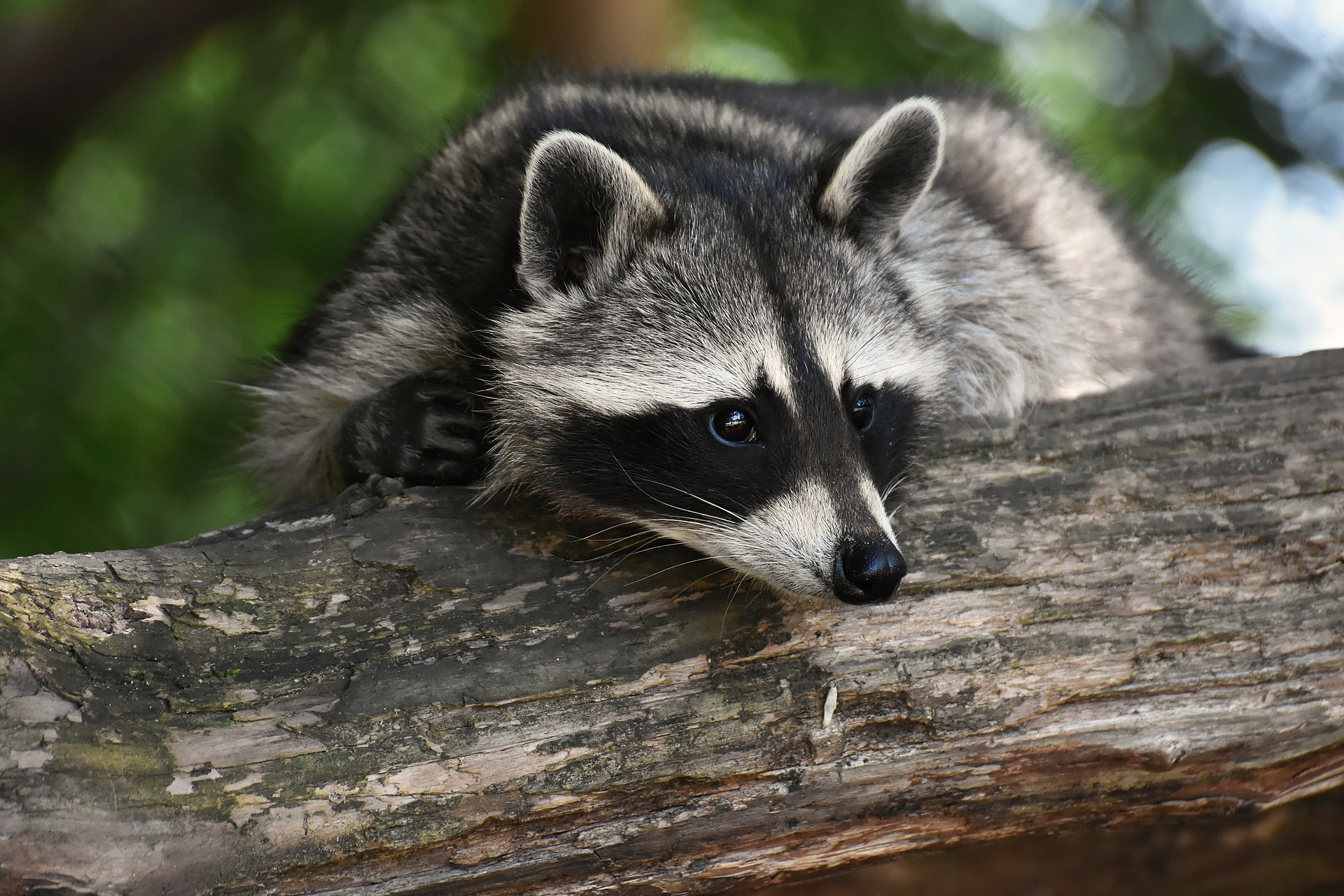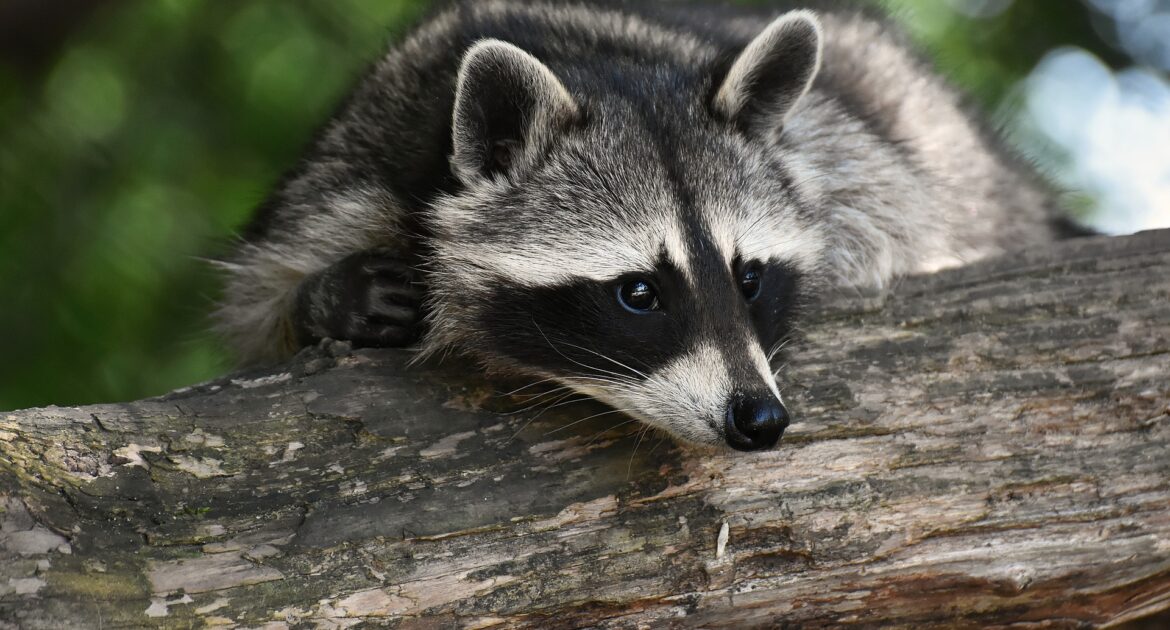Spotting a raccoon basking in the daylight can be an unsettling experience for many homeowners. Our innate associations with these cunning creatures often pigeonhole them as elusive night stalkers foraging under the cloak of darkness. So, when a raccoon crosses your path under the sun’s gaze, it’s easy to jump to conclusions about its health. But do raccoons come out during the day, and does this mean they’re sick? Not necessarily. While raccoons are primarily nocturnal, seeing one in the daylight doesn’t automatically signal illness; however, it’s crucial to be aware of the specific warning signs that could point to a problem.
Our team at Skedaddle Humane Wildlife Control in Ottawa wants to put your concerns at ease by unravelling this natural mystery. We’ll explore what prompts these masked bandits to break their nocturnal habits, helping you understand what to do if you see a raccoon during the day.
Throughout this discussion, we’ll also shed light on scenarios when a raccoon active in the daytime might signal a need for your attention. So, stay with us as we guide you through the various facets of raccoon behaviour, offering clarity and assurance in our wildlife-rich environments.
Normal Reasons For Daytime Activity
Raccoons may venture out during the day for numerous reasons unrelated to illness. Let’s break down the top 3 reasons:
Foraging For Food
It might surprise you, but raccoons sometimes roam during the day, especially when food sources become hard to find. In seasons where their usual nocturnal buffet runs low, they might risk being seen in the daytime to gather enough sustenance. It’s not just about hunger; it’s about survival.
During these times, they might be seen investigating gardens or outdoor bins. They’re opportunists, and in their quest for food, daylight isn’t a strong deterrent. If you notice this behaviour, it’s essential to ensure that garbage cans are secure and food sources are minimized to prevent regular visits.
Nursing Mothers
Motherhood changes everything, even for raccoons. Nursing mothers have mouths to feed, and sometimes, their nightly food runs aren’t enough. This forces them out during the day to gather extra nourishment for their young ones. It’s a maternal instinct driving them, ensuring their babies grow healthy and strong.
If you happen upon a raccoon during the day, it might be a mother on a mission. Like all good parents, she’s looking out for her kids and doing what it takes to keep them fed.
Habitat Disturbance
When their homes face disruption or destruction, these creatures may be forced into daylight activity. Construction, land development, or even natural disasters can displace them, pushing them to find new shelters or food sources at unconventional times. It’s a survival tactic, a response to the sudden changes in their environment.
This disturbance can lead to an increase in sightings around urban areas or neighbourhoods where development is ongoing. Ensuring humane solutions for these displaced animals is crucial to maintaining balance.
Signs That A Raccoon Might Be Sick
When encountering a raccoon during the day, it’s essential to remain vigilant for signs that it might be unwell. While daytime activity can be perfectly normal, certain behavioural and physical cues can indicate a raccoon is sick or distressed. Being able to recognize these warning signs is crucial for ensuring the health and safety of both the raccoon and the surrounding community.
Disoriented Or Lethargic Behaviour
While some raccoons are simply foraging for food, others might not be doing so well. If you notice them stumbling or moving sluggishly, it might indicate illness. A raccoon with its head hanging low, moving less energetically than its peers, could be in trouble and may require professional attention.
These symptoms could mean anything from dehydration to more severe ailments. Observing them from a safe distance can provide insights into their condition without endangering yourself or the animal.
Aggressive Or Unusual Behaviour
Typically shy, raccoons avoid human contact. But if one seems unusually aggressive or bold, approaching people or animals without hesitation, it might be a sign of distress or illness. Such behaviour, especially during the day, is often indicative of deeper issues.
Animals struggling with health problems can become unpredictable. Being mindful of this and ensuring a safe distance is crucial for your safety and theirs.
Visible Injuries Or Poor Grooming
Seeing a raccoon with visible wounds or matted fur can be concerning. These are often signs of health issues or recent injuries. While they might sometimes clean themselves, consistent poor grooming can indicate illness.
If you observe injuries, it’s best to contact professionals who can assess the situation and provide the necessary care. Our team here at Skedaddle Humane Wildlife Control is equipped to handle such instances safely.
Drooling Or Seizures
If you notice a raccoon drooling excessively or experiencing seizures, it’s time to act. These symptoms can be indicative of serious diseases like rabies or distemper. Such conditions not only jeopardize the creature but can pose risks to humans and pets as well.
Immediate attention from wildlife professionals is essential. We at Skedaddle are always ready to address these situations humanely, ensuring safety for both the animals and the community.
Diseases Common In Raccoons
Raccoons can be carriers of a variety of diseases that pose risks to both themselves and humans. Understanding these common ailments is crucial in preventing their spread and ensuring the safety of local communities.
- Rabies: Though not exceedingly common, raccoons can carry rabies. The disease often results in erratic or aggressive behaviour, especially noted if the animal ventures out during the daytime. Understanding and spotting these signs is vital for community safety. Rabies is a severe ailment, and awareness is crucial. If you suspect a raccoon of being infected, contact professionals immediately.
- Canine Distemper: Another disease affecting raccoons is canine distemper. This viral illness manifests as disorientation and tremors and, ultimately, if untreated, can lead to death. Recognizing these signs early can prevent unnecessary suffering for the creature. Distemper doesn’t just affect canines. Being aware of its symptoms can help in early intervention, ensuring the animal receives the help it needs.
- Leptospirosis: A lesser-known disease, leptospirosis, is a bacterial infection that raccoons can carry. It doesn’t always show visible symptoms immediately but is hazardous, especially through contact with their droppings. Being informed about this potential threat can prevent health risks. Maintaining cleanliness around potential raccoon habitats can minimize exposure. If you suspect a problem, our team can assist in assessing and addressing the situation.
What to Do If You See a Potentially Sick Raccoon
When you encounter a raccoon that might be unwell, understanding the proper course of action is crucial for ensuring both human and wildlife safety. Taking the right steps in these situations helps mitigate potential health risks and allows the raccoon to receive appropriate care.
Keep Your Distance
The first rule when encountering a potentially sick raccoon is to maintain a safe distance. Avoid approaching the animal, and ensure children and pets do the same. Observing from afar ensures everyone’s safety while allowing professionals to assess the situation. Raccoons can be unpredictable, especially when unwell. Being cautious ensures safety for all involved.
Do Not Attempt To Remove It Yourself
While it might be tempting to lend a helping hand, attempting to handle or remove a sick raccoon can be dangerous. Without the right equipment and knowledge, there’s a risk of harm to both you and the animal. Leave it to the experts. Our team is trained to handle such situations with care and expertise, ensuring the best outcomes for all parties.
Contact Wildlife Professionals
When in doubt, always call in the pros. Wildlife control professionals, like our team at Skedaddle, have the tools and knowledge to handle raccoon-related issues humanely and efficiently. We can assess the animal’s condition, provide necessary interventions, and ensure they don’t return to problematic areas. Our methods prioritize humane solutions, employing techniques like one-way doors to allow animals to exit while preventing re-entry. This ensures a harmonious coexistence between humans and wildlife.
Ensuring Safety for You and Wildlife
Raccoons, typically nocturnal creatures, seen active during the day could be foraging for food or, more concerningly, unwell. Recognizing signs of illness, such as lethargic movement, aggressive behaviour, or visible injuries, is crucial for ensuring community safety. It’s vital to stay alert to these symptoms—illnesses like rabies or distemper could be the cause of their unusual activity, posing risks to both humans and pets.
At Skedaddle Humane Wildlife Control in Ottawa, we specialize in handling raccoon issues with humane methods. Our team uses techniques like one-way doors to allow animals to exit properties safely while preventing re-entry, ensuring a peaceful coexistence with wildlife. Whether a raccoon is simply exploring or showing signs of illness, our trained professionals are ready to assess the situation carefully and provide efficient, humane solutions.
If you find yourself wondering, “Do raccoons come out during the day?” or “What to do if you see a raccoon during the day?”, remember that our team at Skedaddle is here to help. Raccoon activity during daylight can be an indicator of distress, and it’s important to act cautiously for the safety of all involved. Reach out to us for expert advice and humane interventions. Contact us to request a quote or learn more about how we can assist with safe and professional raccoon control solutions.




